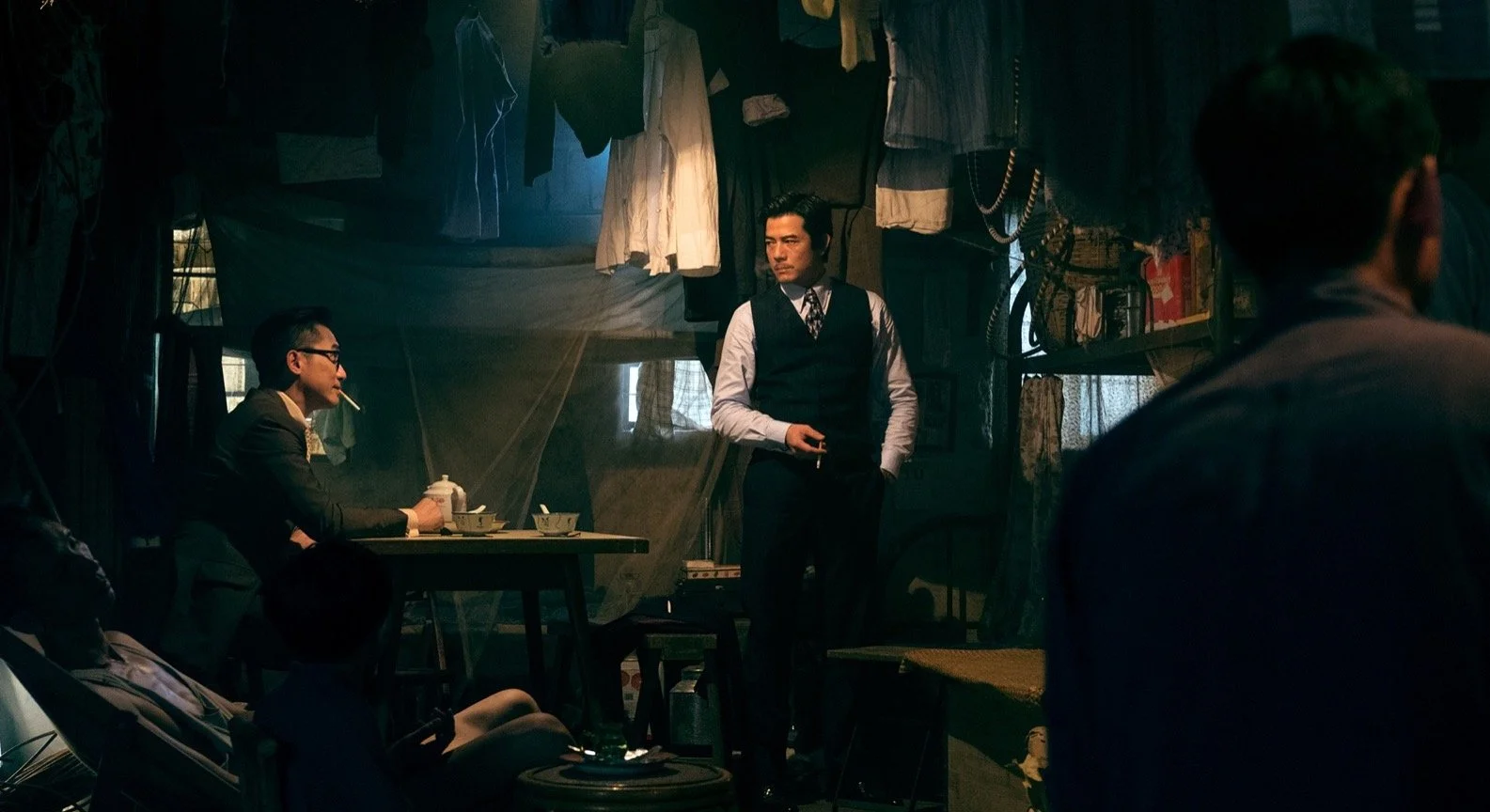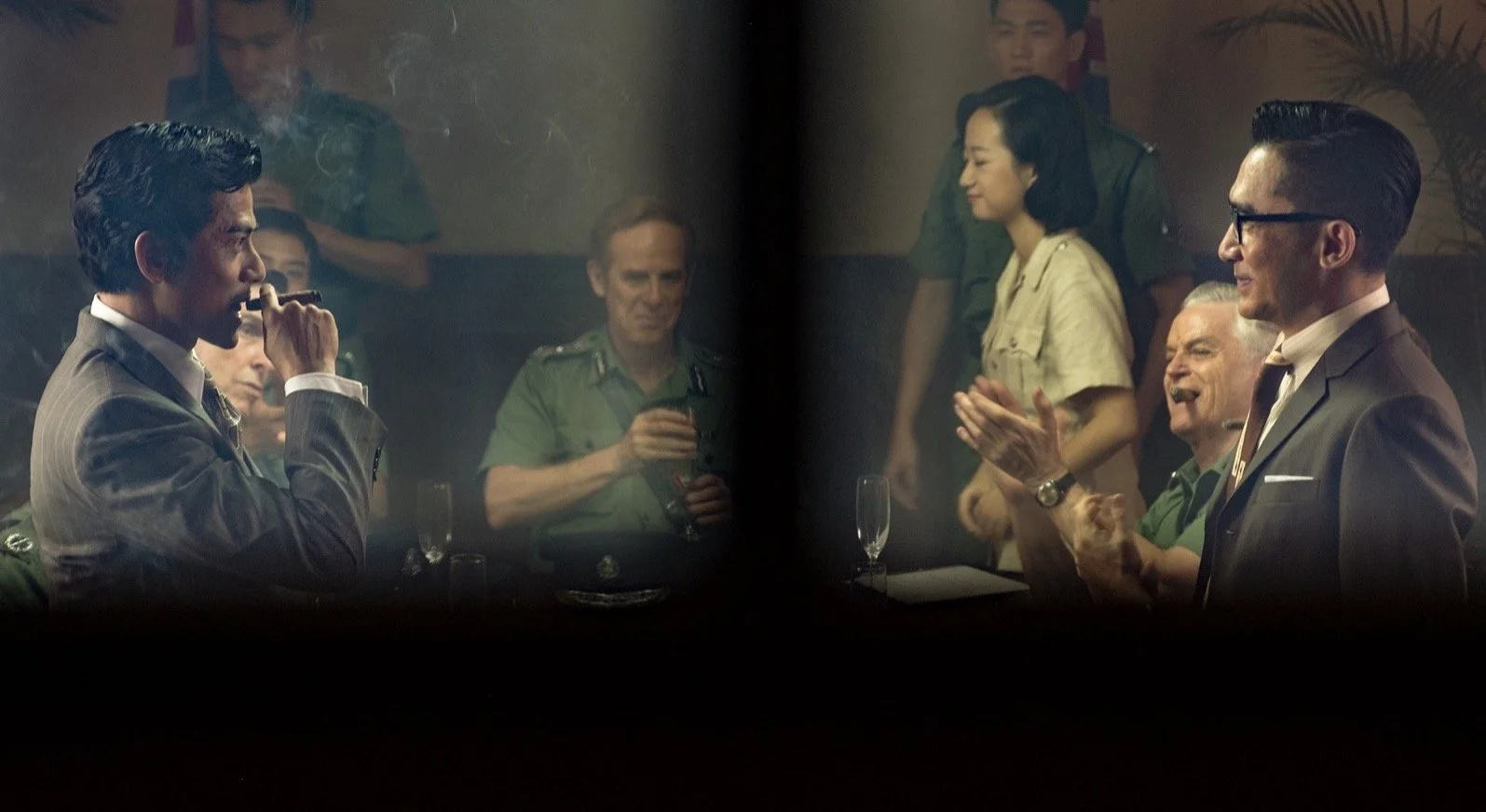It ‘Blows’
Director Philip Yung’s oft-postponed mid-century dirty cop epic lost its teeth somewhere along the way.
Where The Wind Blows
Director: Philip Yung • Writer: Philip Yung
Starring: Aaron Kwok, Tony Leung, Du Juan, Michael Chow, Patrick Tam, Jessie Li, Michael Hui, Jeana Ho, Elaine Jin, Ron Ng, Louis Cheung, Maggie Cheung, Tse Kwan-ho, Lam Yiu-sing, Chui Tien-you, Michael Ning, Cheung Siu-fai
Hong Kong • 2hrs 24mins
Opens Hong Kong February 16 • IIB
Grade: C
Anyone who saw Philip Yung Chi-kwong’s grimy, grotty, wholly unpleasant – in a good way – 2015 crime thriller Port of Call was probably looking forward to his next film. Port of Call was a Category III throwback, reminiscent of the hidden gems that powered the New Wave of the 1980s and early ’90s, shot by Christopher Doyle in saturated, sordid images that captured all that was rotten beneath Hong Kong’s glittery surface. The movie investigation into the (real life) grisly murder of a teenaged prostitute had no heroes in it, and the disaffected nihilism that emanated from the characters in the film, particularly the younger ones, was palpable.
Yung’s follow-up to that memorable work is similarly based on true events from the seedier side of Hong Kong history. Where The Wind Blows | 風再起時 is ostensibly a crime drama tracking the rotten shenanigans and rampant corruption of the HKPD’s bad old days, but for some reason the film has been sanitised enough to be about as analytical, engaging – and comprehendable – as a bottle of Clorox. I can’t imagine why.
Originally titled Theory of Ambitions, way back in 2017, Wind was held up by censors in China in 2018, and was delayed again in 2021 due to “technical difficulties” before finally making its debut at HKIFF in 2022 – in the form the festival swears is the same one that was approved in ’21. Sure, Jan. Censors, no censors, tech…whatever the case, Where The Wind Blows is, in its soul, a Cat III film, and trying to make it otherwise is like forcing a square peg into a round hole; it’s been rendered Netflix levels of bland, assuming you care to deduce what the hell is going on. It’s a repeat of the nigh incomprehensible Detective vs Sleuths.
Wind takes another kick at the 1950s–’70s corrupt cop can, and spins a yarn about the shady exploits of the notorious Lui Lok and his dirty crew. And like serial killers on Netflix, these dudes have had a billion (sometimes) stone classics inspired by them and their illegal antics, among them Poon Man-kit’s To Be Number One (1991), Lawrence Lau’s Lee Rock (1991) and Jeffrey Chiang’s The Prince of Temple Street (1992), both starring Andy Lau, David Lam’s Powerful Four (1992), Wong Jing’s I Corrupt All Cops (2009), Wong and Jason Kwan’s Chasing the Dragon (2017), and Wong and Woody Hui’s Once Upon a Time in Hong Kong (2021).
In Yung’s version crooked Island cop Lui (Aaron Kwok Fu-shing) and dodgy Kowloon cop Nam Kong (Tony Leung Chiu-wai) are just two beat cops who want to make their world a better place, and who let power, money, drugs, and sex get the better of them. In bed with Triads, Lui and Nam eventually butt heads with their so-called partners in crime, drug-dealing cop Yim Hung (Patrick Tam Yiu-man, Breakout Brothers) and garden variety scummy Yau Tsim Mong cop Fatty Sam (Michael Chow Man-kin, The Sparring Partner, which Yung produced). Yung confusingly cuts back and forth between Lui and Nam’s reign of terror and their empire’s collapse, when ICAC investigator George Lee (Michael Hui Koon-man) rolls into town in the 1970s.
That sounds all fine and dandy, and Yung has demonstrated a flair for handling all things unsavoury, and it would be if the main narrative driver was clear: police corruption. The hack job that appears to have been performed on Where The Wind Blows to get it a Cat IIB has done it zero favours. Excising any mention of dirty cops also excises any logical progression between actions and their consequences, and of characters and their growth (or lack of it). This is a series of loosely connected vignettes, whose events are hard to follow (some attempted murders? Money laundering? Maybe trafficking?) and that say little about the conditions that gave rise to corruption on the force, the circumstances that supported it, and even less about the men who practised it.
Shame, because Yung is blessed with an all-star roster (some of them Yung regulars) that can only make you wonder what we may be missing: Jessie Li, Elaine Jin, Louis Cheung, Maggie Cheung Ho-yee, Tse Kwan-ho, Chui Tien-you, Michael Ning and Cheung Siu-fai drop in and drop out, but with so many of the story threads left dangling it’s impossible to tell if they’re any good. Same goes for Kwok, who’s been so reliable in the late period/elder statesman stage of his career (bloated drug belly FTW!), and Leung, who’s always reliable full stop. They bring a manic intensity and slow-burning menace, respectively, to their roles as two of the city’s most reprehensible historical figures, which is why it’s too bad we only get to see half a performance.
There’s a cool film in here somewhere (or maybe on a hard drive someplace), one that usurps crime drama conventions – like when Lui and his eventual wife Choi Chan (Du Juan, European Raiders) break into a Hollywood musical-style dance routine. It’s a bizarre dollop of borderline magical realism and it’s entirely out of place, but it hints at Lui’s confidence in his life’s trajectory and his untouchable DGAF attitude. It’s an interesting creative choice, and it’s unfortunate we’ll never get a look at Yung’s actual vision for the film. — DEK



